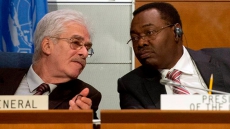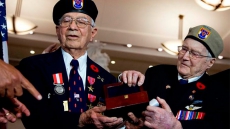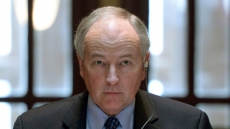TORONTO — Taking in former Guantanamo Bay inmate and government-branded terrorist Omar Khadr as a student would dovetail perfectly with how King's University sees itself, the school says.
The small Christian-principled university in Edmonton, which has developed a relationship with the prisoner over the past six years, has offered admission as part of Khadr's bail application.
"This completely matches what we're about: Our mission is about inspiring and educating learners to be agents of reconciliation and renewal," Dan VanKeeken, the school's vice-president, said in an interview in Toronto this week.
"We don't have a position on Omar. We're just doing what we do."
Khadr, 28, pleaded guilty in 2010 before a widely maligned U.S. military commission to five war crimes he was accused of committing as a 15-year-old in Afghanistan in July 2002. He is now serving out the rest of his eight-year sentence in Bowden, Alta,. as a medium security prisoner.
He is applying for bail — to be heard in March — pending an appeal of his conviction based on U.S. legal rulings that what he did was not a war crime under either international or American law.
King's would be happy to have him among its 715 students and 50 professors as long as he meets admission requirements as a mature student and pays the relevant tuition — about $11,000 a year for a full course load, VanKeeken said. Khadr's lawyer, Dennis Edney, has offered to foot the bill.
The school has, or has had, Muslim, Sikh or Jewish students.
It's "awesome" that King's would be fulfilling its mission as a Christian-based institution, Brenna Hansen, a biology student, said on campus.
"I actually haven't heard a student who is nervous or uneasy," Hansen said. "For the most part, the students are actually proud to attend a university that carries out what it believes in."
Detractors, the federal Conservative government among them, insist Khadr is an unrepentant and murderous jihadist. Some have not been shy about voicing their views.
"You always have the radical reactionary response of: 'Why are you giving a university education to a terrorist?'" VanKeeken said.
"(But) a huge message of our faith is not to be motivated by fear. I hope the government doesn't intervene and foment that fear."
Even some of the school's supporters aren't thrilled at the prospect of Khadr as student, VanKeeken admits.
"Except for a very small percentage of cases, it's not caused donors to stop giving. It's not like, 'Multimillionaire donor walks away from King's'," he said.
"If you're not into social justice and doing the right thing, you don't go to King's and you don't support King's."
Students familiar with Khadr's situation said they would have no problem with him as a classmate.
"Everybody deserves an opportunity for education and it's good of King's to do that and be so public about it," said Erica Prins.
King's began dealing with Toronto-born Khadr during his imprisonment in Guantanamo after students organized a justice-issues conference on his case. Some faculty, most notably English professor Arlette Zinck, put together a special curriculum he could follow from his cell.
Tutoring him, she said at one point, was about a "gesture of mercy and compassion to a young man who has had precious little of that."
About half a dozen King's professors have since joined the voluntary effort, with some visiting him in his Canadian prisons. All consider him intelligent and a diligent student. None believes he is dangerous.
"We're not all like starry-eyed," VanKeeken said. "These are realistic, well-educated, grounded people, who aren't being fooled, who have good judgment."





